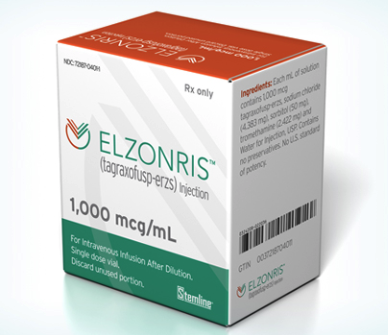Elzonris (tagraxofusp-erzs) vs Vanflyta (quizartinib)
Elzonris (tagraxofusp-erzs) vs Vanflyta (quizartinib)
Elzonris (tagraxofusp-erzs) is a targeted therapy approved by the FDA for the treatment of blastic plasmacytoid dendritic cell neoplasm (BPDCN) in adults and in pediatric patients aged 2 years and older. It works by targeting and binding to a receptor on the surface of BPDCN cells and delivering a toxic protein to these cells. In contrast, Vanflyta (quizartinib) is an oral tyrosine kinase inhibitor specifically designed to inhibit the FLT3-ITD mutation, a genetic alteration found in acute myeloid leukemia (AML), and is used for treating adult patients with relapsed or refractory AML with this mutation. When deciding between the two, it is crucial to consider the specific type of hematologic malignancy diagnosed, as Elzonris is specific for BPDCN, while Vanflyta is targeted at AML with the FLT3-ITD mutation. Additionally, the route of administration (injection for Elzonris vs. oral for Vanflyta), potential side effects, and the patient's overall health profile should be discussed with a healthcare provider to determine the most appropriate treatment option.
Difference between Elzonris and Vanflyta
| Metric | Elzonris (tagraxofusp-erzs) | Vanflyta (quizartinib) |
|---|---|---|
| Generic name | Tagraxofusp-erzs | Quizartinib |
| Indications | Blastic plasmacytoid dendritic cell neoplasm (BPDCN) | Relapsed or refractory acute myeloid leukemia (AML) with FLT3-ITD mutations |
| Mechanism of action | CD123-directed cytotoxin | Tyrosine kinase inhibitor |
| Brand names | Elzonris | Vanflyta |
| Administrative route | Intravenous infusion | Oral |
| Side effects | Capillary leak syndrome, nausea, fatigue, peripheral edema, pyrexia | QT prolongation, myelosuppression, nausea, fatigue, musculoskeletal pain |
| Contraindications | Hypersensitivity to tagraxofusp-erzs or any of its components | Hypersensitivity to quizartinib or any of its components |
| Drug class | Fusion protein toxin | Kinase inhibitor |
| Manufacturer | Stemline Therapeutics, Inc. | Daiichi Sankyo |
Efficacy
Elzonris (tagraxofusp-erzs) Efficacy in Treating Leukemia
Elzonris (tagraxofusp-erzs) is a targeted therapy approved by the U.S. Food and Drug Administration (FDA) for the treatment of blastic plasmacytoid dendritic cell neoplasm (BPDCN), a rare form of leukemia. The efficacy of Elzonris was demonstrated in a clinical trial that included patients with BPDCN who were treatment-naive and those who had been previously treated. The trial showed a clinically meaningful response rate, with a significant portion of patients achieving complete remission or complete remission with a skin normalization. Elzonris works by targeting and binding to a receptor on the surface of BPDCN cells, delivering a toxic payload that leads to cell death.
It is important to note that the safety and efficacy of Elzonris for treating other forms of leukemia have not been established. Its use is specifically indicated for BPDCN, and any off-label use for other types of leukemia would be experimental and not backed by conclusive clinical evidence. Patients with BPDCN who are considering Elzonris should discuss with their healthcare provider the potential benefits and risks associated with its use.
Vanflyta (quizartinib) Efficacy in Treating Leukemia
Vanflyta (quizartinib) is an oral medication that has shown efficacy in the treatment of acute myeloid leukemia (AML) with a specific genetic mutation known as FLT3-ITD (internal tandem duplication). This mutation is associated with a particularly aggressive form of AML and a poorer prognosis. In clinical trials, quizartinib has demonstrated a capacity to induce remission in a subset of patients with relapsed or refractory AML with the FLT3-ITD mutation. The drug inhibits the FLT3 enzyme, which is involved in the proliferation and survival of malignant cells.
While Vanflyta offers a targeted approach for FLT3-ITD positive AML patients, its efficacy in other forms of leukemia or in AML without the FLT3-ITD mutation is not well-established. The use of quizartinib is therefore tailored to the genetic profile of the leukemia, and patients should undergo appropriate diagnostic testing to determine FLT3-ITD mutation status before starting treatment. As with any medication, the decision to use Vanflyta should be made in consultation with a healthcare provider, taking into account the individual patient's health status and treatment history.
Regulatory Agency Approvals
Elzonris
-
European Medical Agency (EMA), European Union

-
Food and Drug Administration (FDA), USA

Vanflyta
-
European Medical Agency (EMA), European Union

-
Food and Drug Administration (FDA), USA

Access Elzonris or Vanflyta today
If Elzonris or Vanflyta are not approved or available in your country (e.g. due to supply issues), you can access them via Everyone.org.
How it works

Make an enquiry
Choose the medicine you want to buy, answer a couple of questions, and upload your prescription to speed things up. We’ll get back to you within 24 hours.


Make an enquiry
Choose the medicine you want to buy, answer a couple of questions, and upload your prescription to speed things up. We’ll get back to you within 24 hours.


Breeze through the paperwork
We'll guide you through the required documents for importing unapproved medicine, ensuring you have all the necessary information.


Get a personalized quote
We’ll prepare a quote for you, including medicine costs and any shipping, administrative, or import fees that may apply.


Receive your medicine
Accept the quote and we’ll handle the rest - sourcing and safely delivering your medicine.

Some text on this page has been automatically generated. Speak to your physician before you start a new treatment or medication.
Let's talk
If you have any questions, call us or send us a message through WhatsApp or email:
Contact us




